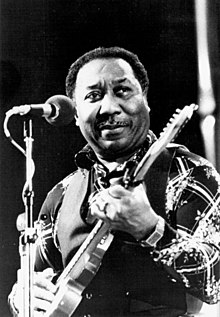
Back ميدي واتر Arabic مودى واتيرس ARZ مادی واترز AZB Muddy Waters BAR Мадзі Уотэрс Byelorussian Мадзі Ўотэрз BE-X-OLD Мъди Уотърс Bulgarian Muddy Waters Breton Muddy Waters Catalan Muddy Waters Czech
This article needs additional citations for verification. (March 2023) |
Muddy Waters | |
|---|---|
 Waters performing in 1976 | |
| Background information | |
| Birth name | McKinley Morganfield |
| Born | April 4, 1913 Issaquena County, Mississippi, U.S. |
| Died | April 30, 1983 (aged 70) Westmont, Illinois, U.S. |
| Genres | |
| Occupations |
|
| Instruments |
|
| Discography | Muddy Waters discography |
| Years active | 1941–1982 |
| Labels | |
| Website | muddywatersofficial |
McKinley Morganfield (April 4, 1913 – April 30, 1983),[1][2] known professionally as Muddy Waters was an American blues singer, songwriter and musician who was an important figure in the post-World War II blues scene, and is often cited as the "father of modern Chicago blues".[3] His style of playing has been described as "raining down Delta beatitude".[4]
Waters grew up on Stovall Plantation near Clarksdale, Mississippi, and by age 17 was playing the guitar and the harmonica, copying local blues artists Son House and Robert Johnson.[5] In 1941, Alan Lomax and Professor John W. Work III of Fisk University recorded him in Mississippi for the Library of Congress.[6][7] In 1943, he moved to Chicago to become a full-time professional musician. In 1946, he recorded his first records for Columbia Records and then for Aristocrat Records, a newly formed label run by brothers Leonard and Phil Chess.
In the early 1950s, Waters and his band—Little Walter Jacobs on harmonica, Jimmy Rogers on guitar, Elga Edmonds (also known as Elgin Evans) on drums and Otis Spann on piano—recorded several songs that became blues classics, some with the bassist and songwriter Willie Dixon. These songs included "Hoochie Coochie Man," "I Just Want to Make Love to You" and "I'm Ready". In 1958, he traveled to England, laying the foundations of the resurgence of interest in the blues there. His performance at the Newport Jazz Festival in 1960 was recorded and released as his first live album, At Newport 1960.
Waters' music has influenced various American music genres, including rock and roll and subsequently rock.
- ^ Palmer, Robert (May 1, 1983). "Muddy Waters, Blues Performer, Dies". The New York Times. Retrieved December 4, 2017.
- ^ Gordon 2002, pp. 4–5.
- ^ Muddy Waters: Can't Be Satisfied (DVD). Winstar Communications. 2003.
- ^ Cogan, Jim (2003). Temples of Sound: Inside the Great Recording Studios. Chronicle Books. p. 10. ISBN 9780811833943. Retrieved July 16, 2019.
- ^ "His thick heavy voice, the dark colouration of his tone, and his firm, almost solid, personality were all clearly derived from House," wrote the music historian Peter Guralnick in Feel Like Going Home, "but the embellishments, which he added, the imaginative slide technique and more agile rhythms, were closer to Johnson."
- ^ Palmer, Robert (October 5, 1978). "Muddy Waters: The Delta Son Never Sets". Rolling Stone. p. 55.
- ^ Gordon, Robert (May 24, 2006). "Muddy Waters: Can't Be Satisfied". PBS. Retrieved January 6, 2015.